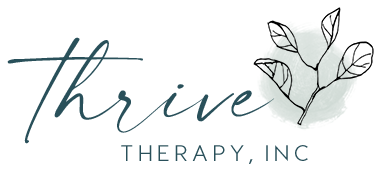I don’t know about you, but the past couple of years have kicked my ass and self-care strategies have not been a priority.
It’s been a ride, right?
By the time you factor in the threat of COVID-19, a change in home responsibilities, figuring out how to run a practice online, 4 kids and their activities, two parents working from home, some lock-down, then attempting to reintegrate into the world….it’s been a lot. Oh yeah, when you add in that I specialize in PTSD treatments in my Thrive Therapy clinical practice, it makes sense that I’d feel a bit worn down.
I’ve learned in the past couple of years working with my team of therapists, that being a mental health provider has: 1) proven to be a very secure career choice during a pandemic, and 2) has made us busier than ever with fewer resources.
While your combination of stresses likely looks different than mine, if you’ve come to this blog you’re probably doing similar work. And, whatever is currently on your plate is likely very tough to balance. Therapists are constantly trying to strike a balance between energy in and energy out. When specializing in trauma-related work, our batteries can drain even quicker due to the heavy nature of the things we hear and work through with our clients. We often find ourselves dealing with secondary trauma ourselves.
Grad school and CEU courses talk a lot about “self-care” and “preventing burnout,” but professional settings, at least in my experience, don’t do much to help. Oftentimes clinics come with their own metrics for success, which translates to over-scheduled and under-supported therapists. Over time, it chips away at us more and more and affects us personally, and professionally, and in turn, has an impact on our effectiveness as a therapist.
What are some self-care strategies we as trauma therapists can utilize to care for ourselves?

Recognize the unique workday you have.
Give yourself some compassion and understanding we freely give to our clients. It’s easy to lose sight of the type of work we do. We are joining with other humans to help them confront past trauma and to move through the pain in such a way that is setting them up for a more fulfilling life. Pretty damn cool.
Ask yourself what you can do to de-stress throughout the day.
Don’t overwhelm yourself. Can you stretch for 2 minutes between appointments? Can you do a couple of minutes of breath work? Quickly IM a colleague or text a friend with an inside joke for a quick laugh? Get outside for even a little bit? Create new habits where self-care becomes part of your day-to-day and not a separate activity. This will allow you to recharge throughout the day instead of feel completely empty by the end of it.
Make time to eat. And pee. How many times do you chug through an entire day without eating lunch or even going to the bathroom?
:: nervously raises hand::
Not only is this not physically healthy, it leads to other unhealthy behaviors creating a series of bad habits for yourself. Schedule yourself a lunch where you can just eat- not type notes or return calls at the same time. Oh yeah, and pee. Don’t forget to pee.
Practice the self-care strategies you preach.
Now we’re getting into the tougher stuff. Boundaries. Saying no. If your response to #3 was, “OMG I could never take a lunch break”, then this one is for you. Many of us can help others set boundaries like a boss. No matter if you work for yourself or for others, it’s easy to find ourselves saying “yes” when we need to say “no” to seeing one more client, staying one more hour, working evenings or weekends, or picking up the slack from another. Why? And for what? Depleting yourself is self-defeating. Over time, you’re becoming less effective as a provider if you’re overextending yourself. Remember that the next time you book over your lunchtime.
Reconnect with your why.
Why did you become a mental health provider? If “helping people” was something that came to mind, you’re in good company. Now think about it: what does it take to help others? “You can’t pour from an empty cup” is my mantra. We cannot help others unless we have a full cup.
Tending to your own well-being isn’t a luxury, it’s crucial.
Connect with others who get it.
If you have a case that is particularly triggering, connecting with someone who gets it can be super helpful. I have my go-to’s to call when I need to vent, unload, or who gets the dark humor that comes along with tough work. You don’t have to explain or qualify things you’re saying, you can just show up. Be clear ahead of time if you need a listening ear, a consult, or just support so your needs are met.
Ask yourself some deeper questions:
Am I in an environment that is in line with my values? Ouch. Another tough one. If you’re doing all the things within your control and still over-worked and under-valued…is it time for a change? Is your environment getting in the way of you being an effective provider for your clients? Is your environment getting in the way of you living your life how you want?

Find an outlet.
Exercise, hobbies, etc. You probably expected this one. But seriously…your life cannot be mental health and trauma all the time. Life is more than that. Get back into hobbies you used to enjoy or get extra crazy and try something new. Maybe it’s something exercise-related, something creative, or something outdoors. This is a great way to have an outlet for stress, but also an opportunity to reset, recharge, and find more of that balance we need.
Remember that no one else is going to make your self-care a priority.
Full disclosure: this took me a long time to figure out. People around you can talk about work/life balance and self-care. But truly, no one is aware of everything on your plate except for you. No one is aware that doing that one extra thing is costing you your lunch, costing you time with your friends/family, and costing you the time needed to recharge so that you can keep doing what you do. You have to get really clear with what you need and hold to it.
Get a therapist.
This one is really non-negotiable. I know, I know, it can be hard to find a therapist as a therapist, especially if you’re well connected or in a small town. However, creating a space that is for you and making that a priority helps in a multitude of ways. To find a great fit, ask around, reach out, and connect. Invest in yourself and lead by example.
Finally, create an overall structure.
Do what you can to protect your sleep time, your diet, and your exercise. Keep your work schedule as consistent as possible. Schedule meals, hobbies, connection into your daily schedule. Start creating those healthy habits and pay attention to how this positively impacts your clinical work. Two planners I’ve fallen in love with to help with this (no affiliation with either, just a fan) are Passion Planner and Rocketbook (specifically the Panda Planner).

I hope that this list, while not exhaustive, is helpful to you. You have a pretty cool job, but it comes with added responsibility. If you don’t take time to fill your cup, you’ll have nothing left to give.
Take care,
Jenn
GET HELP WITH SELF-CARE STRATEGIES IN OHIO AND KENTUCKY
As therapists ourselves we get it, trust me, being a therapist can be draining. But, it is a much-needed and worthwhile profession! If you are at a point where you are beginning o reprioritize your self-care strategies I am here to help and support you in my online Ohio-based therapy practice.
The PTSD therapists at my therapy practice in Ohio use evidence-based strategies to help reduce and eliminate your PTSD symptoms. Our services are available online to those in Ohio and Kentucky. If you are ready to get support, follow the steps below to get started.
-
Meet with a therapist to discuss your needs
-
Take back control of your PTSD symptoms and live in the present once again
OTHER SERVICES AT THRIVE THERAPY
Here at our Ohio-based counseling practice, our therapists have an extensive understanding of PTSD. We help folks who are survivors of sexual assault and childhood trauma overcome those traumas and PTSD symptoms. Additionally, we help first responders navigate and overcome PTSD. It is our greatest honor to help those who have suffered in silence find support, connection, and recovery in PTSD treatment.


